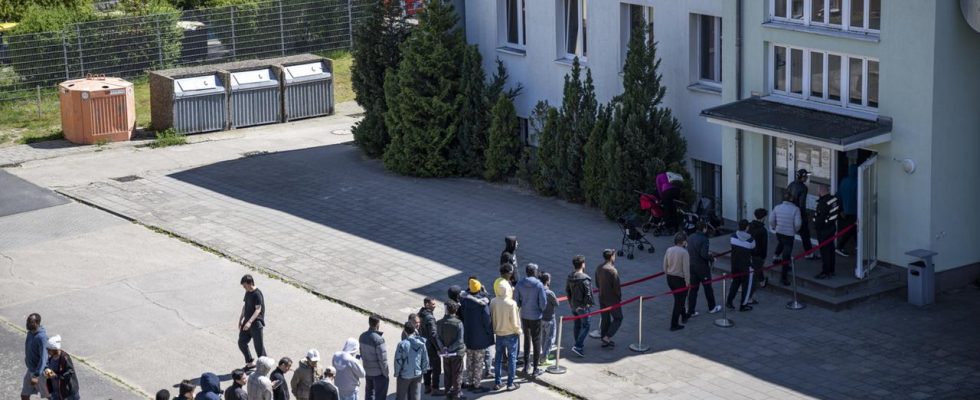Who pays what – this has long been the central issue in the migration debate between the federal and state governments. Now the focus seems to be shifting: before the summit, the country leaders are calling for fewer migrants to be accepted.
In the ongoing migration debate, representatives of the federal states reiterated their call for a limit on the number of newly arriving refugees before the top meeting with Chancellor Olaf Scholz and Union parliamentary group leader Friedrich Merz. “The most important thing is that measures are taken to ensure that fewer people come,” said Hesse’s Prime Minister Boris Rhein ARD morning magazine.
The main problem, from his point of view, is that at the moment “the impression in the world is that there is limitless openness in Germany,” added the current chairman of the Conference of Prime Ministers of the states. At the same time, the CDU politician emphasized that there was no single measure that would solve the problem. You shouldn’t have too high expectations of the meeting in the evening; it is a first start and therefore a first step.
Kretschmer: “Money is not the first topic”
One of the main issues so far has been the distribution of burdens between the federal and state governments when it comes to accommodating refugees. The question of financial support for federal states and municipalities in looking after refugees will not be the central focus this time, said Hessian Prime Minister Rhein. However, it is still “an issue” because considerable resources have to be spent on care and accommodation. This creates a risk of imbalances in the budget, which would then have to be mitigated, emphasized Rhein.
The Saxon Prime Minister Michael Kretschmer made a similar statement. Mayors and district administrators need the necessary financial resources, said the CDU politician on the RTL and ntv channels. “Money is not the first issue, but the first issue is to limit and reduce the inflow to Germany,” added the head of government.
Wüst accuses the federal government of “hesitant” action
Scholz and Merz want to discuss the course of migration policy with top representatives of the federal states in the evening. Beforehand, the states want to coordinate at a Prime Minister’s Conference. Rhein said he expects the states to appear united. At the same time, he warned against hectic action and activism in the migration debate. The country “doesn’t need quick fixes,” he said. To solve the problem, “very many individual points” would have to work together. It is therefore “good” that Scholz has now made the issue a “matter for the boss”.
North Rhine-Westphalia’s Prime Minister Hendrik Wüst criticized the federal government for its hesitant approach. “After months of waiting since May, we now have a bill for better repatriation. During this time, 270,000 people have come back to us,” said the CDU politician on RTL. He now expects a clear signal from the summit with Scholz. “Together in small steps wouldn’t be enough right now – something really has to come out of it.”
Lindner: The level of benefits must be questioned
According to Federal Finance Minister Christian Lindner, the focus should be primarily on curbing illegal immigration. “The first thing is not to finance migration, but to reduce illegal immigration,” said the FDP politician to the “Rheinische Post”. The discussion about the distribution of financial burdens should not distract from this goal.
“We must concentrate on reducing the incentives of our social system,” emphasized the minister. The federal government’s contribution to the costs cannot be clarified separately from the switch to benefits in kind. “In addition, the level of benefits in the Asylum Seekers Benefits Act and access to the health system must be questioned,” said Lindner. Both could reduce the financial requirements for the state as a whole.
Habeck defends package of measures
Federal Interior Minister Nancy Faeser presented an initial package of measures on Wednesday. The SPD politician’s draft law provides for measures for faster deportations of criminals and refugees without the right to remain. At the same time, the parties in the traffic light coalition also agreed to enable asylum seekers to take up work more quickly.
The plans presented are not without controversy. The Union sees the possibility of starting work more quickly as an additional incentive to come to Germany. Habeck defended the plans. It’s about “removing pressure from the situation,” said the Green politician ARD morning magazine. The regulation will only apply retroactively to those who came to Germany by December last year, he said. Faster integration into the labor market is beneficial for everyone involved. “People should earn their own money,” he said.
District council calls for compulsory work for migrants
That didn’t go far enough for the district council. The association called for all migrants to be required to work. “Anyone who is healthy and not handicapped has to work. There has to be a duty to work,” said President Reinhard Sager to the “Bild” newspaper. It doesn’t matter whether it’s charitable work or work in the catering industry, for example.
The district council was not invited to the top-level discussion in the Chancellery. “We are not at the summit and have not heard anything from Scholz,” explained Sager. “We are bearing the brunt and are not sitting at the table. We urgently need the support of the 16 prime ministers.”

